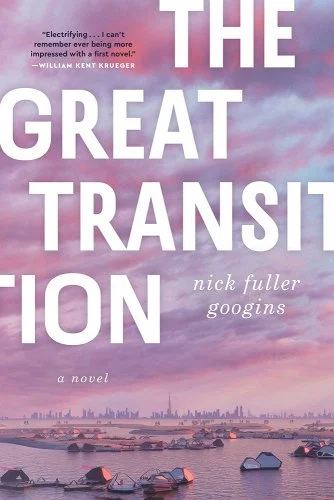[ad_1]
I tore through Nick Fuller Googins’s debut novel, The Great Transition, over spring break, which my family spent in Wilmington, NC, a beautiful coastal town that could be substantially submerged by high tides as early as 2030 and completely underwater by 2100 if current carbon emission rates continue.
In The Great Transition, we meet Emi Vargas, a teenager born in the near future following the climate crisis and eponymous great transition. After the assassination of a group of climate criminals, Emi’s mother, a possible suspect, disappears. What follows is a beautifully rendered account of both Emi’s search for her mother but also, thirty years earlier, the story of Emi’s parents, who fought the rising waters and massive wildfires of the crisis. Googins’s novel is simultaneously terrifying and hopeful, a fast-paced and moving story that also serves as a call to collective action.
I had the pleasure of discussing this engaging and prescient novel with Nick Fuller Googins over email.
This conversation was edited for length and clarity.

Joanna Pearson
Congrats on such an accomplished and ambitious and scarily relevant novel! Could you talk about the origins of The Great Transition? I’m always curious if novels start with a character, specific voice, or a pressing concern?
Nick Fuller Googins
The first seed of inspiration for The Great Transition took root in the summer of 2018, when I was working in rural Maine installing solar panels for a small family-owned company. Some people might remember 2018 as a really exciting moment for climate stuff…AOC had won her primary, the Sunrise Movement was conducting sit-ins across the country, Bernie was rumored to be running again, people were talking about a Green New Deal…I’ve always been involved and interested in climate and environmental causes, so as I was lugging solar panels up ladders and scrambling around hot asphalt rooftops, I was also fantasizing that maybe the stars could align, like maybe we could actually pull this off as a country and launch a Green New Deal, putting millions of Americans to work installing solar, wind turbines, you know, all the jobs that we need to do to save the world…and I would sometimes think to myself, like oh my god, I could be part of that! I know how to install solar panels! And it would just give me the chills, imaging being one small part of a mass mobilization to save the planet, like what better thing to do with my life? What better legacy to leave?
Well obviously those Green New Deal stars did not align politically, but the fiction-writer in me ran with it, imagining a version of the Green New Deal as the “The Great Transition.” Because I was in coastal Maine, and working with guys from the area, I first saw it through the voice of one 17-year-old kid from rural Maine, Larch, who has lost everyone and everything to the climate crisis, only to find family, belonging, and purpose when he enlists with the Great Transition, saves the world, falls in love, and has a daughter named Emi. Once Larch and Emi came to life, the novel ran with them, so even though I had initially set out to write a hopeful climate book, The Great Transition quickly evolved into a family novel.
Joanna Pearson
You do such a skillful job interweaving timelines here, with Emi’s father telling a kind of personal/climate history that predates Emi, Emi conducting a personal history project with her mother, and the novel’s present. Technical question: how did you arrive at this structure? Did you plan it from the start or did it come to you as you started writing?
Nick Fuller Googins
The Great Transition came out of my love for science fiction, fantasy, speculative fiction, all of it. Reading and writing in these genres, I find world building to be such a tight-rope balancing act. Like on one hand, a story can die a quick bogged-down death if too much information is dumped onto the reader in the first chapters; but on the other hand, without enough details about the world, we are just floating in this miasma of uncertainty with nothing to ground the book. So I knew I had to be really careful with The Great Transition; like how was I going to describe the mechanics of a post-nation-state, post-fossil-fuel world run by a federation of worker-cooperatives, without it reading like a political-economics report? But then I realized, oh—what if Emi’s teacher assigned her class a big research report on the Great Transition! This was a fun way of conveying broad world-building information to the reader from the voice of the main character; it also let me weave in Emi’s deepest anxieties as a fifteen-year-old kid growing up in post-climate-crisis utopia, and—this was also very key—it let me bring her mother’s voice directly to the page through transcripts where Emi interviews her. And yeah, I’ve taught and tutored for almost two decades, and have edited and corrected approximately eight million essays like Emi’s, so it was very fun to add her teacher’s comments into the margins.
Joanna Pearson
Even while recognizing the limits of classifying literature, I’m always curious to hear how writers would categorize their own work. Is this climate fiction? Literary dystopianism?
Nick Fuller Googins
My editor calls The Great Transition a “hopeful climate novel.” Sometimes I call it a “climate crisis utopia”—which sounds like an oxymoron, I know, but I think of it as “the best worst case scenario,” the best place economically and politically and environmentally that humanity could reach given the bleak climate science we face today. Some readers still use the term “dystopian” when describing the book, which I get—we’ve read so many dystopias, it’s hard for us to imagine otherwise—but I’m trying to push back on that label. I think of dystopias as novels of the individual…one person or a very small group, trying to survive against overwhelming odds in a harsh world. The Great Transition, on the other hand, is a novel of the collective; sure, it follows one family, but all their struggles and victories are defined by their participation in this mass collective mobilization of millions of people all fighting for the same end.
As the climate crisis continues to worsen and threaten our very existence, I wouldn’t be surprised if “Cli-Fi” or “climate fiction” is just going to be “fiction.” Pretty soon it will be strange to read a contemporary novel that doesn’t mention the climate crisis; it would be like reading a novel set in France in 1943 that totally ignores WW2.
Joanna Pearson
Following up on that, I’m curious what authors you consider your literary lineage. In reading The Great Transition, I also thought of works by Octavia Butler and Emily St. John Mandel, but I wonder if there are others with whom you feel a kinship? Or just other writers/works that have deeply impacted you and the writing of this book.
Nick Fuller Googins
The beating heart of literary inspiration behind The Great Transition was the work of Ursula K. LeGuin, specifically her novel, The Dispossessed, which in my humble opinion is the greatest utopia ever written. I do love Octavia Butler’s Parable books, and of course Station Eleven, and both were inspirational as they beautifully portray mini-utopias in the midst of global dystopia. But The Dispossessed really stands out as a family-driven novel set in a large, successful utopian project that is under threat as the book opens; without The Dispossessed, I can’t imagine I would’ve even had the framework to begin thinking about The Great Transition. Since writing it, I’ve been deeply honored to find myself in a broader conversation with other hopeful climate writers such as Kim Stanley Robinson and Allegra Hyde. Allegra Hyde read an early galley of The Great Transition and welcomed me to “Team Utopia,” a label I wear with immense pride. Membership is open to all.
Joanna Pearson
One theme that emerges pretty clearly in your novel is a vision of collective action. Can you talk about the role you see fiction playing in calls to activism?
Nick Fuller Googins
Some of the times I’ve felt most “alive” in my life have revolved around collective activities: playing baseball and hockey as a kid, dancing in a big group, playing trombone in a marching band…and then certainly with activism, too. I come from a proud family of activists. My great grandmother was a suffragette, and was pregnant with my grandfather when she was arrested for chaining herself to the Massachusetts State House gates. My mother was arrested trying to block an oil pipeline in Minnesota. I was arrested protesting the second Iraq War, a million years ago. Whether it’s walking a picket line, or marching against a war, or campaigning for progressive candidates, these have been some of the most electrifying moments for me as a human being, becoming a very small part of a big, hopeful collective project. For most of the history of our species, we’ve engaged in big collective projects. I think collective action is ingrained in our DNA. We’re a cooperative, social species. Only recently we’ve become more private and individualistic, with really harmful effects, like suicide and overdoses and mass shootings. And the novel as an art form, is generally an individualistic sort of endeavor, like mostly focused on one person, or a small group, and I think that sense of collective energy that is essential to our humanity is sometimes lost. I wanted to bring back that power of collective action into The Great Transition, as something that is both essential to our humanity, but also for plot of the novel, as it nourishes—even saves—characters like Larch, who had lost everything and were despondent before enlisting to save the planet.
I don’t have any illusions of The Great Transition inspiring anyone to blow up a pipeline or a natural gas terminal (although that would be great!) but I do hope the novel will remind readers of the power and sense of purpose that comes from joining a group, being part of a project bigger than ourselves. Join your union, join a local climate group, campaign for a local progressive candidate. Working with others not only feels great, but it’s the only way humanity has ever done anything worthwhile, and it will be the only way we have any hope of surviving the climate crisis with a planet that our descendants can enjoy.
Joanna Pearson
There’s a moment early in your book where Emi describes the inaction of generations before her with regard to climate change like this: “Imagine your house is on fire, but instead of getting the fire department, you just watch the flames and live life like everything is fine.” For people reading your book and acknowledging the metaphorical house is on fire, what ought we to be doing?
Nick Fuller Googins
Emi is fifteen years old, born well after the climate crisis, yet she has a more accurate view of our current dire situation than many people in charge do now. She’s right: our house is on fire! The facts are so bleak: the past eight years have been the warmest eight on record. Exactly zero of the world’s largest emitters are on track to meet Paris Agreement reduction goals. The Biden administration approved more oil and gas drilling in its first two years than Trump did. I could go on and on, but we all know what’s happening: our house is on fire, and those in charge are doing basically nothing to put out the flames.
I talk about the climate crisis in my fourth grade classroom because it feels weird not to; these kids are going to grow up in a very different Maine than they know now. We watch speeches by Greta [Thunberg], who my students adore. I think about something Greta says, along the lines of “We cannot live sustainably in an unsustainable system.” All these efforts we see now for recycling, sustainable packaging, even the climate provisions in the Inflation Reduction Act: I hate to say it, but it’s way too little, way too late, given the bleak science of the climate crisis. What Greta is saying is that our economic model is geared towards pushing us further into the climate crisis, so if we want to escape the worst of what’s coming, we need to change the entire model.
What does this mean for regular people like us? What can we do? At the very least, as a bare minimum, we can vocally support the most extreme solutions, because they are not extreme, they are practical, given what the science is telling us needs to happen. We need to spend trillions of dollars to put tens of millions of people to work overhauling our entire energy grid. We need programs like Medicare for All and universal childcare in order to support those millions of workers who will be overhauling the grid. We need to immediately stop all fossil fuel extraction. We need a Green New Deal. We need all of it. This is not dreaming, it’s just science. I try not to play Monday Morning Quarterback, but we monumentally screwed up in 2020, not electing Bernie, by far the most practical, forward-thinking climate candidate. I wish we could change the past, but oh well, moving on, at least we can avoid that mistake again. So, at the very least, we need to support the most ambitious climate candidates and plans. You don’t want to be that climate delayer who goes around saying “it’s just not feasible” or “it’s not practical” or “it’s a great idea but how will we pay for it?” Either we do what the science requires, or we and our descendants will pay so terribly for our inaction.
On a more involved level, people can join a group. Be a part of something. Better to try and fail than never try at all. Sierra Club, Sunrise Movement, 350.org, Extinction Rebellion. For older folks, Third Act is a great climate group that just started for elders.
And then, on an even more involved level, I’ll just mention the popular 2021 nonfiction book, How to Blow Up a Pipeline, by Swedish author Andreas Malm, and the fictionalized film adaptation that just came out. Both are great to advance the conversation about tactics if we are serious, as a species, about stopping the climate crisis. So check them out! See where the inspiration takes you!

FICTION
The Great Transition
By Nick Fuller Googins
Atria Books
Published August 15, 2023

[ad_2]
Source link

